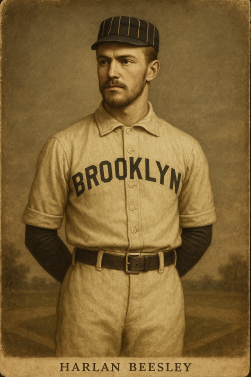The Federal League: 1878
“Here Today, Blue Tomorrow”
If 1877 had been the year of confusion over names, then 1878 was the year of surprises. The league, down to five when Detroit folded after the 1877 campaign, expanded back to six clubs with the admission of the Cleveland Blue Caps, while the grandees of Chicago learned that no constitution could guarantee eternal supremacy on the field.
Boardroom Maneuvers
Cleveland’s addition was a pragmatic one. The industrial city on Lake Erie promised both financial stability and a geographic bridge between Chicago and the eastern clubs. The Blue Caps, as the cranks quickly dubbed them, were welcomed in with cautious optimism. Charles W. Garrison, though, never trusted expansion. He grumbled that weaker markets invited weaker play — and nothing gnawed at him more than the idea of Chicago descending to mediocrity.
As it turned out, mediocrity was exactly what he got.
On the Field
 For the first time since the league’s founding, the Chicago Base Ball Club fell below .500, posting a dismal 28–33 mark and stumbling to fourth place. Harry Taylor, once the unbeatable workhorse of the Cyclones, began shifting away from the slab. He still started 35 games, but also saw extended time at second base. His numbers told the story: a grim 12–22, 3.39 ERA line, paling next to teammate Sam Coleman’s solid 14–8, 2.45.
For the first time since the league’s founding, the Chicago Base Ball Club fell below .500, posting a dismal 28–33 mark and stumbling to fourth place. Harry Taylor, once the unbeatable workhorse of the Cyclones, began shifting away from the slab. He still started 35 games, but also saw extended time at second base. His numbers told the story: a grim 12–22, 3.39 ERA line, paling next to teammate Sam Coleman’s solid 14–8, 2.45.
The season instead belonged to the “B cities” — Brooklyn and Boston.
The Brooklyn Athletics captured their first pennant at 36–25, powered by the superb play of 23-year-old Harlan Beesley. After defecting from New York, Beesley led the league in stolen bases (22), triples (11), and on-base percentage (.476) while batting .321. His blend of speed and discipline electrified the cranks, and though Brooklyn’s lineup was otherwise middling (save for steady third baseman Dick Sebastian at .312), it was enough. Young pitcher Ed Wales (26–11, 2.50) provided the muscle on the mound, and together Beesley and Wales carried Brooklyn to glory.
The Boston Resolutes surprised nearly everyone by finishing second, just two and a half games back. Left fielder Curt Johnston became the league’s first true power hitter, pacing all clubs with 8 home runs and 50 RBI — feats that prompted whispers that base ball might be shifting away from small-ball to a more muscular game.
Chicago, meanwhile, saw the emergence of an unlikely star. Will Hickman, at 35 years old, abandoned Brooklyn for Chicago and promptly won the batting title at .340. His reward was a lucrative contract in Cleveland for 1879, leaving Garrison fuming over both Hickman’s disloyalty and his payroll. Beside him, versatile Morgan “Cap’n” Cook shifted to third base and hit .328, good for second in the batting race.
Cleveland’s new club had its own moment in the sun. Former Chicago castoff John Mattern found new life with the Blue Caps, leading the league with a 2.19 ERA. At season’s end, however, Mattern stunned supporters by announcing his retirement, citing a “dead arm.” At just 33, he was finished.
On the pitching front, Nick Harding of Boston and New York’s Gus Murphy tied for the league lead in victories, each winning 33. Murphy, the Irish ace, continued to prove himself the backbone of the Columbians’ staff, even as Beesley’s departure left their offense thin.
Final Standings, 1878
| Team | W | L | WPct | GB | R | RA |
|---|---|---|---|---|---|---|
| Brooklyn Athletics | 36 | 25 | .590 | — | 307 | 274 |
| Boston Resolutes | 33 | 27 | .550 | 2½ | 345 | 314 |
| New York Columbians | 33 | 28 | .541 | 3 | 271 | 249 |
| Chicago Base Ball Club | 28 | 33 | .459 | 8 | 331 | 349 |
| Cleveland Blue Caps | 28 | 35 | .444 | 9 | 264 | 279 |
| Philadelphia Unions | 26 | 36 | .419 | 10½ | 256 | 309 |
A League in Flux
The cranks joked that the “B’s” — Brooklyn, Boston, and Beesley — ruled the year. For Garrison, it was no laughing matter. His Chicago constitution had given the Federal League structure, but 1878 reminded him that no document, no matter how sternly written, could protect his own club from failure.
The Federal League, now three years old, was learning an uncomfortable truth: survival was no longer the question. Success was.